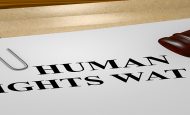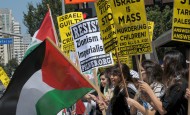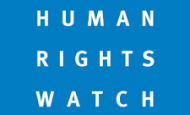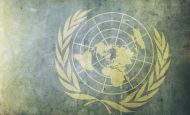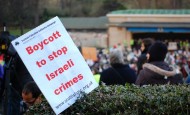UN Officials Promote HRW’s In-House BDS Activist
On April 25, 2019, three UN Special Rapporteurs issued a statement titled “UN experts call on Israel to overturn deportation of Human Rights Watch director.” The statement supports Human Rights Watch (HRW) Israel/Palestine Director and long-time BDS activist Omar Shakir, who failed to convince an Israeli court to force the Interior Ministry to grant him a new work visa.
Shakir’s visa was not renewed by the Israeli government in April 2018, and Shakir and HRW took the government to court challenging the denial and the law upon which the government’s decision was based. Shakir – one of several HRW employees in Israel, the West Bank, and Gaza – was allowed to remain in Israel for an extra year during the duration of the court proceedings.
Despite the unequivocal right for a country to control entry into its borders and the issuance of work visas, and the extensive due process afforded to Shakir throughout the process, the three UN Special Rapporteurs claimed the court decision “threatens advocacy, research, and free expression for all and reflects a troubling resistance to open debate.”
The statement reflects the close collaboration between HRW and the UN Office of the High Commission for Human Rights (OHCHR),1 particularly on BDS, and largely parrots HRW’s tendentious April 16, 2019 press release. Notably, one of the authors is Special Rapporteur Michael Lynk, who has troubling associations with fringe NGOs that promote antisemitic BDS campaigns against Israel; his self-admitted lack of expertise in international law; and numerous moral failures, as shown in labeling a virulent antisemite as a “human rights defender” in his March 2017 report to the UN Human Rights Council (see NGO Monitor’s report “Special Rapporteur on Israel: The UN’s Weakest Lynk”).
In the statement, the Rapporteurs falsely apply the term “human rights defender” to Shakir, and falsely claim that “the grounds for revoking Mr. Shakir’s work permit appear to be tied directly to his human rights advocacy, and have nothing to do with any assertion of illegal conduct.” The Rapporteurs also echo the self-serving and blatantly false assertion from HRW that, “neither the organisation nor Mr. Shakir promotes the boycott of Israel.” In fact, the Israeli court found that “since arriving to Israel he [Shakir] has continued his efforts to boycott Israel, but instead [of participating] in conferences and university panels, he now uses his Twitter account and other means to share his calls for boycotts.”
As noted, despite its promotion of boycotts of Israel, HRW will still have multiple employees in Israel, the West Bank, and Gaza when Shakir leaves.
Moreover, Shakir cannot be considered a human rights defender as he is a long-time activist for antisemitic BDS, “lawfare,” and a “one-state” forumula. The vast majority of his tenure at HRW is marked by various BDS campaigns (FIFA, Airbnb, promotion of the UN BDS blacklist, etc.) and whitewashing and minimizing Hamas terrorism. Shakir’s promotion of the obsessive singling-out of Israel and antisemitism (as defined by the consensus working definition of the International Holocaust Remembrance Alliance [IHRA]) and his advocacy for economic damage is neither “human rights advocacy” nor “civil society work” designed to “defend and advance the principles guaranteed in the International Bill of Human Rights.” Those who promote BDS, like Shakir, represent the antithesis of the universal principles set out in the International Bill of Human Rights.
NGO Monitor documented Shakir’s twitter activity in June 2018-February 2019, showing his role in promoting BDS and anti-Israel campaigns. During this period, Shakir tweeted 970 times (including retweets) on issues relating to the Arab-Israeli conflict, ranging from boycotting businesses over the 1949 Armistice line, the violence along the Gaza border, and his lawsuit against the Israeli government.
Eighteen of Shakir’s tweets condemned alleged Israeli attacks on Palestinians. In contrast, Shakir did not add his own voice in condemnation of terrorist attacks against Israelis terrorist attack, such as the murder of Ari Fuld in September, the murder of two Israelis in the Barkan Industrial Park by a Palestinian terrorist in October, the shooting of a pregnant woman outside Ofra in December resulting in the death of her baby, or the brutal murder of a 19-year-old in Ein Yael forest in Jerusalem.
In remarks made at a February 2019 event in the Netherlands, Shakir revealed that his campaigns targeting companies doing business with Israel, like Airbnb, are part of a “three- to five-year” strategic plan and a “theory of change.”
In addition, while the Rapporteurs claim that “The UN experts do not take a position on BDS,” Lynk regularly speaks at events alongside prominent BDS groups. (See “Special Rapporteur on Israel: The UN’s Weakest Lynk” for a detailed list of events.)
The Rapporteurs also invoke strawman arguments when they note “that expressing support for, or opposition to, BDS, is fully guaranteed by the rights to freedom of opinion, expression and association.” Shakir has the right to say whatever he wants about BDS and will undoubtedly continue his advocacy upon return to the US. As a non-citizen, however, he does not have the right to an Israeli work visa for life.
Footnotes
- Many former senior HRW officials have senior positions at OHCHR. HRW has also been one of the leading proponents for and collaborators on the UN’s BDS blacklist. HRW is also granted by OHCHR special privileges (access to closed meetings and website advertising) that are not given to other NGOs. The process by which HRW is granted these benefits is entirely secret.
